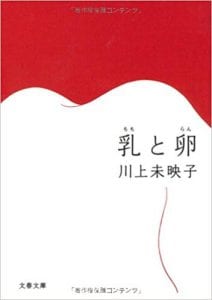Kawakami Mieko 川上未映子. Chichi to ran 乳と卵. 2007.
Winner of the 138th Akutagawa Prize, for the second half of 2007.
The story concerns the unnamed narrator, an adult Osaka woman living in Tokyo; her 39-year-older sister Makiko, visiting Tokyo; and Makiko’s almost-pubescent daughter Midoriko. Makiko is a single mom, works as a bar hostess, and is thinking about getting breast enlargement surgery; Midoriko is a moody child, in the middle of a vow of silence. The two of them go to visit Makiko’s sister, the narrator, in Tokyo, and the story takes place over the course of the three or so days of their visit. The narration is interspersed with excerpts from Midoriko’s diary.
It’s kind of like The Vagina Monologues with an Osaka accent. That is, the theme of the book is (very obviously) women and how they feel about their bodies. We never get to the bottom of why Makiko wants her breasts enlarged, but the debate is certainly aired over whether she’s doing it for herself or for men. Meanwhile, Midoriko, who hasn’t started her period yet, is terrified of it, and is obsessed with ovulation, and what a curse it is for women- she hates the thought of it, hates that it dooms her to having to fear reproduction, hates the thought of reproducing. Hates/pities her mother, and wishes her mother had never had her. Meanwhile the narrator almost never tells us what she’s thinking – we learn very little about her – but in the course of the story her period surprises her and we watch her washing her underwear and the futon and musing about how she’s been irregular lately, and how this is another lost opportunity to get pregnant.
Not much happens. Basically it’s tensions between Makiko and Midoriko, and these finally erupt (predictably) with Midoriko breaking her silence and yelling at her (remind you of this moment?); they break down and both start smashing eggs into their faces—their own faces…symbolic, a little? Kind of a typical junbungaku scenario, in which people refuse to even try to communicate, all the better to create significant and resonant scenes impressing us with the complexity or hopelessness of whatever issue is being discussed, and/or life in general. In real life, if someone wanted to know why her sister was getting a boob job, wouldn’t she just ask? If she wanted to know why her sister and niece weren’t speaking, wouldn’t she ask one of them? If her sister came home eight hours late, drunk, and said she’d gone to see her daughter’s daddy, and you wanted to know if she succeeded in seeing him, and why she’d gone to see him in the first place, wouldn’t you just ask? Sure we can imagine families so alienated from each other that they could never broach such subjects—but in junbungaku, they’re all so alienated that they can’t even imagine what it would be like to actually communicate. So in that sense, the story is clichéd, I thought.
On the other hand, even at this late date the story’s frank look at women’s bodies and how they feel about them, and its unapologetic, completely open adoption of a female point of view on these issues, still seems fresh and daring, at least in a Japanese context. These parts of the novel worked – and Midoriko’s journal excerpts really worked – by which I mean they felt authentic, and powerful, and necessary. For these reasons, I could well imagine using the novel in a class someday.
So why did it get the prize? I can never answer that question. The committee comments on the obi talk about the assuredness and vividness of the Osaka dialect in which the story is narrated; but right now all comedy on Japanese TV has a Kansai accent – the Yoshimoto clique has taken over – so in the culture at large using Osaka-ben seems to be the norm now rather than an exception, and kind of a shorthand signifier for authenticity (to be fair, it’s been used like that in literature for a long time).
[edited 11/17/09 to add the rest of the review, which somehow escaped my original cut and paste job]
The book also includes an o-make story, “Anatatachi no ren’ai wa hinshi あなたたちの恋愛は瀕死” (“Your love is on its last legs”) about an unnamed woman who wanders the department stores of Shinjuku one Saturday afternoon, lonely, and eventually tries to pick up a guy handing out tissues on a street corner, only to run into his frustration over his dead-end job; he punches her out without thinking about it. Kind of a nonplussing story, but at least it’s not in Osaka-ben.
